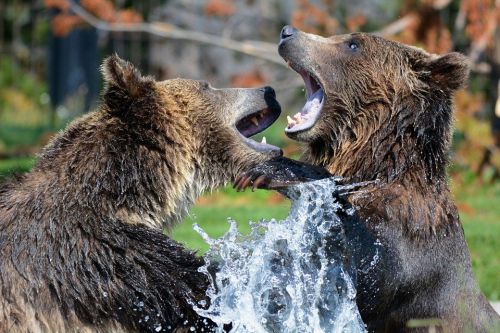We found 12 interesting facts about bears
Powerful and dangerous mammals that love honey.
Bears belong to the bear family. Their sizes vary greatly depending on the species. Found in North and South America, Europe and Asia.

1
The average lifespan of bears is 25 years in the wild and up to 50 in captivity.
2
Bears are naked and blind immediately after birth.
3
Adult bears can run at a speed of 50 km/h.
4
There are 9 species of bears.
American bear, Andean bear, bamboo bear, blue bear, brown bear, Himalayan bear, cave bear, Malayan bear and polar bear.
5
Bears spend about 16 hours a day searching for food.
6
The largest bears are polar bears.
Males reach a weight of up to 700 kg and a length of 3 meters. The height at the shoulders of an adult polar bear can reach 1,5 m.
7
Bears are omnivores.
They all love the taste of honey, but each species has different culinary preferences. Polar bears love seal meat, American bears love forest fruits and insect larvae, and pandas primarily eat bamboo (though they also like small animals).
8
The biggest threat to bears is the loss of their natural habitat.
Deforestation, agriculture and human settlement growth contribute to this phenomenon.
9
Bears can adopt a bipedal stance.
Most often they do this when they are trying to determine the source of the smell that has reached them.
10
Bears are very smart.
They have the largest and most complex brains of any animal of their size. Grizzly bears remember hunting locations even ten years later. We were also able to observe how bears covered their tracks and hid behind rocks to hide from the hunters' sight.
11
6 species of bears are listed in the Red Book of Endangered Animals.
12
In winter, bears hibernate.
They have developed an interesting mechanism that allows them to reduce heart rate, body temperature and metabolism when restricting food in winter. Grizzlies and black bears can hibernate for up to 100 days. During this time they do not eat, drink or defecate. They use fat reserves accumulated in the summer as a source of energy.
The next
Super
0
Interestingly
0
Poorly
0
Comments